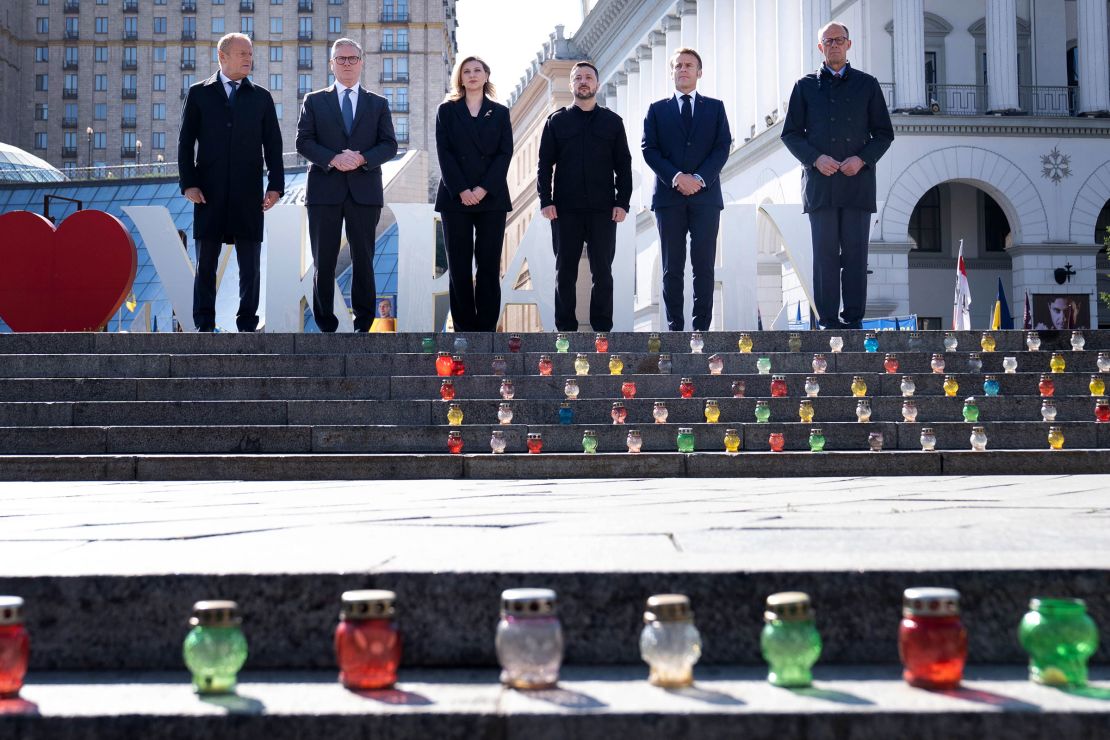Kyiv, Ukraine
CNN
—
The leaders of Germany, France, the United Kingdom and Poland have arrived in Kyiv for meetings with Ukraine’s President Volodymyr Zelensky, a symbol of a united European position to publicly pressure Russian President Vladimir Putin to agree to a 30-day ceasefire in his war against Ukraine.
Friedrich Merz, the new German Chancellor, French President Emmanuel Macron, Britain’s Prime Minister Keir Starmer and his Polish counterpart Donald Tusk arrived together Saturday morning at Kyiv’s main railway station, where they were met by Zelensky’s chief of staff Andriy Yermak.
The meetings are a sign of a renewed diplomatic urgency aimed at achieving a ceasefire in the war between Russia and Ukraine, which is grinding on despite US efforts to broker peace.
“There is much work to be done and many issues to discuss. This war must be ended with a just peace. Moscow must be forced to agree to a ceasefire,” Yermak wrote on his Telegram channel.
The first stop for the European leaders was Kyiv’s Independence Square where they stood to honor fallen Ukrainian soldiers.
Ukraine, supported by the Europeans, has been calling for an immediate unconditional 30-day ceasefire, something that US President Donald Trump is also demanding.
The European leaders in Kyiv had a “fruitful call” with Trump on Saturday which was “focused on peace talks,” Andrii Sybiha, Ukraine’s foreign minister, said in a post on X.
“Ukraine and all allies are ready for a full unconditional ceasefire on land, air, and at sea for at least 30 days starting already on Monday,” Sybiha continued, adding that a “durable ceasefire” could pave the way to full-scale peace negotiations if Russia agrees.
Russia has so far refused to commit, saying it supports the idea of a 30-day ceasefire in principle but insists there are what it calls “nuances” that need addressing first.

Kremlin spokesman Dmitry Peskov in an interview with ABC News on Saturday suggested that one of these “nuances” was putting a halt to the supply of US and European weapons to Ukraine.
Putin has often spoken about the need to address what he calls “root causes” – which are taken to mean, among others, the eastward expansion of NATO.
In a Truth Social post on Thursday, Trump wrote that “if the ceasefire is not respected, the US and its partners will impose further sanctions,” adding to a sense he is growing frustrated with Russian stalling.
The inauguration of Trump in January ushered in a complete change in the US’ diplomatic focus on the war, with Ukraine and key allies fearful of a significant tilt in US policy towards Moscow.
European leaders have convened a series of meetings in response, aimed both at showing the US that Europe can do more to support Ukraine militarily, as well as providing a single voice urging the US president not to take Russia’s side in the war.

“A just and lasting peace begins with a full and unconditional ceasefire. That is the proposal we are advancing with the United States,” French President Macron wrote on his X account Saturday morning.
“Ukraine accepted [the ceasefire proposal] on March 11. Russia, however, delays, sets preconditions, plays for time, and continues its war of invasion. If Moscow continues to obstruct, we will step up the pressure—together, as Europeans and in close coordination with the United States. We welcome President Trump’s call to move forward in this direction,” Macron added.
Later on Saturday morning, Ursula von der Leyen, the president of the European Commission, said in a post on X that “the ball is now in Russia’s court.”
“We stand ready to maintain strong pressure on Russia and impose further biting sanctions in the event of a breach of a ceasefire,” von der Leyen said. “Our objective is clear: a just and lasting peace for Ukraine, which is vital for security and stability across our continent.”
CNN’s Daria Tarasova-Markina and Niamh Kennedy contributed to this report.



